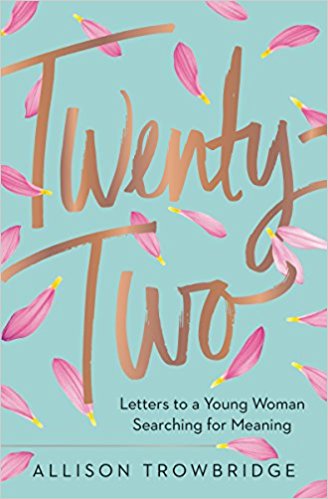Championing “women’s issues” is not the same as championing women.
That’s according to Allison Trowbridge, author of “Twenty-Two: Letters to a Young Woman Searching for Meaning.” She claims that while feminists have focused on admittedly important political issues, they have often done so at the expense of personal development. And it’s time for that to change.
While she was a senior at Westmont College, she searched for a book to guide her as a young woman and came up empty-handed. Now 31, Trowbridge has decided to write the book she needed then. “Twenty-Two” is a collection of empowering letters to a fictional woman on topics ranging from vocation to beauty to marriage.
Here we discuss how Christian women have often been served poorly and what can be done about it.
RNS: You believe young women today often struggle to grow into and embrace their womanhood. Why do you think this is?
AT: I think we’re facing a relational crisis for women today. So often we fail to lift each other up. We compare and compete and fail to see another woman’s success as success for all women.
In the church, we still are locked into systems and structures that prevent women from flourishing and sharing the fullness of who they are within their congregations. We relegate women to women’s ministry, rather than allow them to lead across all ministry. We’ve made huge strides in the last 50 years, so I’m hopeful. But we still have a long way to go to see women’s place in society, and in the church, fully realized.
RNS: Male and female feminists have been fighting for women’s issues for years. While you approve of many of these efforts, you think they have often fallen short of truly empowering women. How so?
While it’s important to advocate for equal pay for women, we cannot ignore equal empowerment of women. Many feminists’ efforts have focused on political issues, which are good, but they have done so at the exclusion of personal development. We need both.
My heart is to invest in the personal development of a generation of women to help them grow in areas that have been too often overlooked.
RNS: You say that many Christians have a broken view of beauty that harms women. Explain what you mean by this.
AT: Our society has a broken view of beauty, and sadly the church isn’t much different. Look at the cover of any Christian novel and you’ll see an image of a pretty, slender young women in the dress of that fictional era. It’s the same old cultural ideal.
Our faith says that inner beauty matters most, but too often we fail to live by that. We fail to recognize that beauty, like any living thing, is fleeting. And that is God’s glorious, mysterious design.
We must learn how to honor and elevate the deeper beauties—of wisdom and character and service. The beauty of wrinkles and imperfections and authenticity. Physical beauty can and should be appreciated, but it is just the icing on the outside of our lives. Icing is enticing, but nobody wants to eat a whole cake of it.
 RNS: Part of the reason you wrote “Twenty-Two” was to encourage a culture of mentorship to propel women forward. What do you suggest as a way to scale this?
RNS: Part of the reason you wrote “Twenty-Two” was to encourage a culture of mentorship to propel women forward. What do you suggest as a way to scale this?
AT: We need to begin by dealing with comparison. I write about this a lot in the book, because I’m as bad as the next woman in this department. Too often I hold myself up to some manufactured ideal and feel like my life isn’t “enough.”
For example, social media should be a place where we celebrate one another. Instead, it’s the place where we tear our identity down because our life doesn’t look like our neighbor’s.
Comparison steals joy, and it damages our ability to love ourselves and others well. When we get to the heart of our comparison issue and address it, we can begin to get real and authentic. We can learn from one another, celebrate our differences, and lift each other up.
RNS: But it’s not just on women. Men often hold women back, right? For example, Mike Pence took heat for adhering to the “Billy Graham rule,” which some believe marginalizes women. What is your view of that practice, as a Christian woman and leader?
AT: You know what, I respect and admire the spirit with which Vice President Pence has made that decision—we need more public figures demonstrating that they honor their marriage. But I don’t agree with his methodology.
If my male bosses and coworkers through the years had refused to share meals with me because I’m a woman, I would not be where I am professionally today. I would have missed out on so many important conversations, on strategic decisions, on partnerships and travel, and ultimately on all the opportunities that allowed me to not feel less-capable than my male colleagues.
I think hard and fast rules like these only end up creating taboos around gender and hurting those involved. What matters most is context: a candlelight dinner at a nice restaurant is very different than a quick bite together at the airport. As a culture, I’d love to see us break these taboos so we can hold marriage in the highest regard while giving women equal opportunity—in both the church and the workplace.







